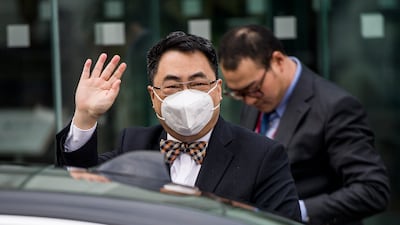China has called on the US to lift all sanctions on Iran that are not compatible with the now defunct 2015 nuclear deal, including restrictions on Iran-China trade, according to Ambassador Wang Qun, Beijing's envoy to the United Nations.
The current US position is that some sanctions can be lifted – a departure from former president Donald Trump's "maximum pressure" campaign. But Iran has insisted the US moves first and lifts all sanctions before any nuclear site inspections can resume, and re-iterated that position on Monday.
While the sweeping lifting of sanctions by Washington is currently unlikely, a loosening of restrictions on China-Iran trade would open the door to increased co-operation between Beijing and Iran.
China is already Iran's leading trade partner, exporting nearly $10 billion worth of goods to Iran each year, while Iran exports nearly $9bn worth of goods to Iran, mainly oil and related products.
But in recent years, two-way trade has been limited by concerns over US trade sanctions among some Chinese companies.
"Amb. Wang Qun, at today's Joint Commission meeting of the #JCPOA, stressed that dialogue & negotiations are the only right way to solve the #Iran #nuclear issue, & the US should lift all sanctions, inconsistent w/ JCPOA, against Iran & 3rd parties, including #China," China's permanent mission to the United Nations and other international organisations said on Twitter.
It was not clear what Mr Wang meant by "inconsistent with the JCPOA", but international sanctions against Iran broadly fall under those related to Iran's nuclear programme that were re-imposed by the US in 2018 when the Donald Trump administration exited the Joint Comprehensive Plan of Action (JCPOA) - the formal name for the nuclear deal.
Secondary sanctions can impact companies doing business with sanctioned Iranian companies.
Another set of sanctions, many of which have been in place for decades, relates to Iran's non-nuclear activities, including sponsorship of regional militias, human rights violations and Iran's conventional missile and drone programmes.
Mr Wang has long supported Iran through on-off talks with Washington and world powers including Britain, France, Germany and Russia, as well as the EU, which have attempted to reach a new compromise on UN inspections of nuclear sites in exchange for a lifting of trade sanctions.
In June 2020, Britain, France and Germany pushed for an International Atomic Energy Agency resolution condemning Iran's reluctance to allow full UN inspections of nuclear sites. Mr Wang said "the root causes of this situation lie in the unilateral and bullying practices of the US".
The ambassador struck a different tone on Tuesday, hoping all sides could reach a compromise.
"China will continue to practice genuine multilateralism, participate in the next phase of negotiations in a constructive manner, and work with all parties to promote the early achievement of results in this negotiation," Mr Wang said.









